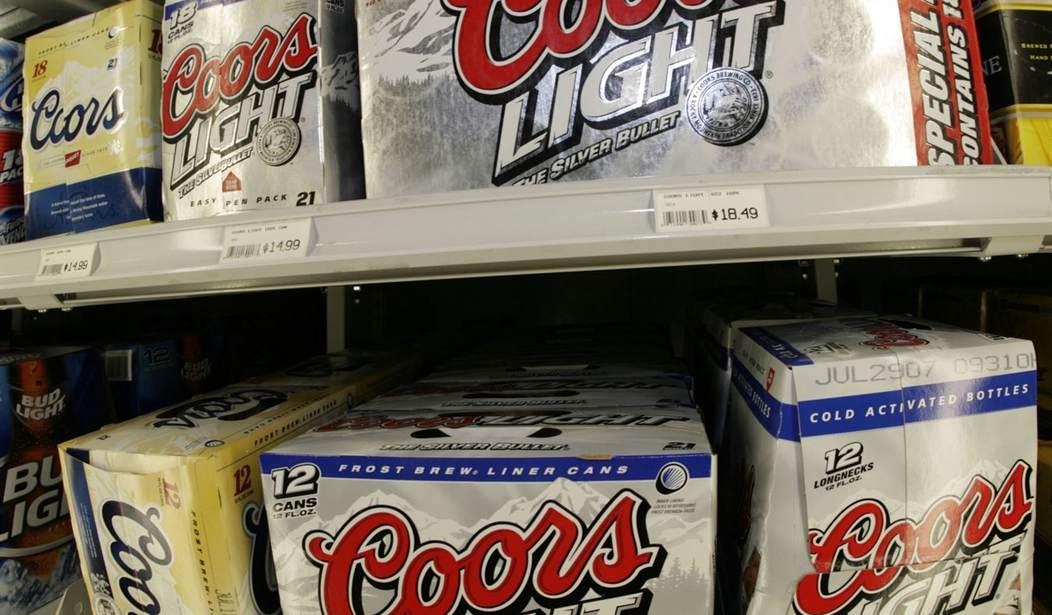One is a data point. Two is perhaps a coincidence. Three is a trend. And once you get past three, it begins to look like a full-scale movement -- especially when the events begin happening on their own.
Robby Starbuck scored another victory in his campaign to shame corporations over their use of discriminatory policies under the "Diversity, Equity, Inclusion" (DEI) rubric. Beer giant Molson Coors threw in the towel this week after Starbuck initially contacted them over their practices and their partnership with the Human Rights Campaign (HRC) "Sanity is making a comeback," Starbuck declared:
Big news: Last week I messaged executives from @CoorsLight @MolsonCoors to let them know that I planned to expose their woke policies. Today they’re preemptively making changes.
— Robby Starbuck (@robbystarbuck) September 3, 2024
Here are the changes:
• Ending participation in the @HRC’s woke Corporate Equality Index social… pic.twitter.com/RuOVb1IuNU
Here are the changes:
• Ending participation in the @HRC’s woke Corporate Equality Index social credit system.
• No more DEI based training programs.
• No more donations to divisive events.
• Ending ERG groups in favor of BRG groups open to all employees, no longer designed to focus on race or sexual orientation.
• No more supplier diversity goals.
• No more executive/employee compensation tied to DEI hiring goals.
It's not as though they're bailing because HRC gave them a hard time, either. Starbuck points out that Molson Coors got a 100 rating from HRC when they made this move, and that also seems to be a pattern in the accelerating movement away from DEI in corporate America. The Wall Street Journal notes that more companies now want to separate themselves from the hard-Left HRC, even though they all had previously aligned almost totally with them:
[Ford] last week told employees it would stop providing workplace data to the gay-rights lobbying group, which spent decades persuading big companies to embrace policies hospitable to lesbian, gay, bisexual, transgender and queer employees and customers.
Other companies dialing down diversity initiatives this summer also said they would distance themselves from HRC: Harley-Davidson, Lowe’s, rural retailer Tractor Supply and distiller Brown-Forman, which makes Jack Daniel’s. On Tuesday, Molson Coors TAP 0.77%increase; green up pointing triangle also said it would stop working with the group.
The companies didn’t elaborate on why they highlighted HRC in their announcements. Nearly all of them had ranked well on an index that HRC uses to score companies by their LGBTQ-friendly policies. Some of the companies said they would stop sharing data with HRC after they had been targeted by social-media activist Robby Starbuck.
Starbuck told the WSJ that he didn't mention HRC or its role in their policy initiatives with most of these companies. It turns out that Starbuck didn't need to do so. "I don't think I need to," Starbuck said. "I think the companies put two and two together."
And now more companies appear ready to follow:
The focus on the HRC—and in particular its equality ranking—marks a shift in efforts to unwind diversity initiatives in the private sector. This year, companies have mostly faced pressure over workplace and funding programs based on race and ethnicity, including pay incentives, grants and supplier contracting. But a few companies—including the brewer of Bud Light—have suffered from backlash from consumers upset over LGBTQ support.
It's not just that the executives may favor LGBTQ politics in their private lives. The problem is that they make it impossible to avoid in workers' and consumers' lives. Watch Starbuck's presentation to see how deep and how entangling those DEI/woke policies reach into their workplaces, those of their suppliers, and the reach into consumers' lives as well. The Bud Light backlash arguably had less to do with trans activist Dylan Mulvaney and more with marketing exec Alissa Heinersheid's deliberate insulting of their consumer base. But when Target started marketing "tuck" swimwear for kids and other LGBTQ products designed by a Satanist, well, that certainly got the attention of both consumers and investors.
HRC started off as a gay-rights organization defending equal employment for gays and lesbians, Had they stuck to that mission, no one would likely even know who they are -- and that's a big reason why they have expanded into a DEI/woke activist group. They wanted to expand their empire and their power, and they certainly succeeded at both ... until the normies decided enough was enough.
Now they're a liability in the marketplace, and corporate America is belatedly discovering that. Starbuck may have gotten the ball rolling, but at a certain point momentum and reality takes over. And that inflection point may have arrived.







Join the conversation as a VIP Member